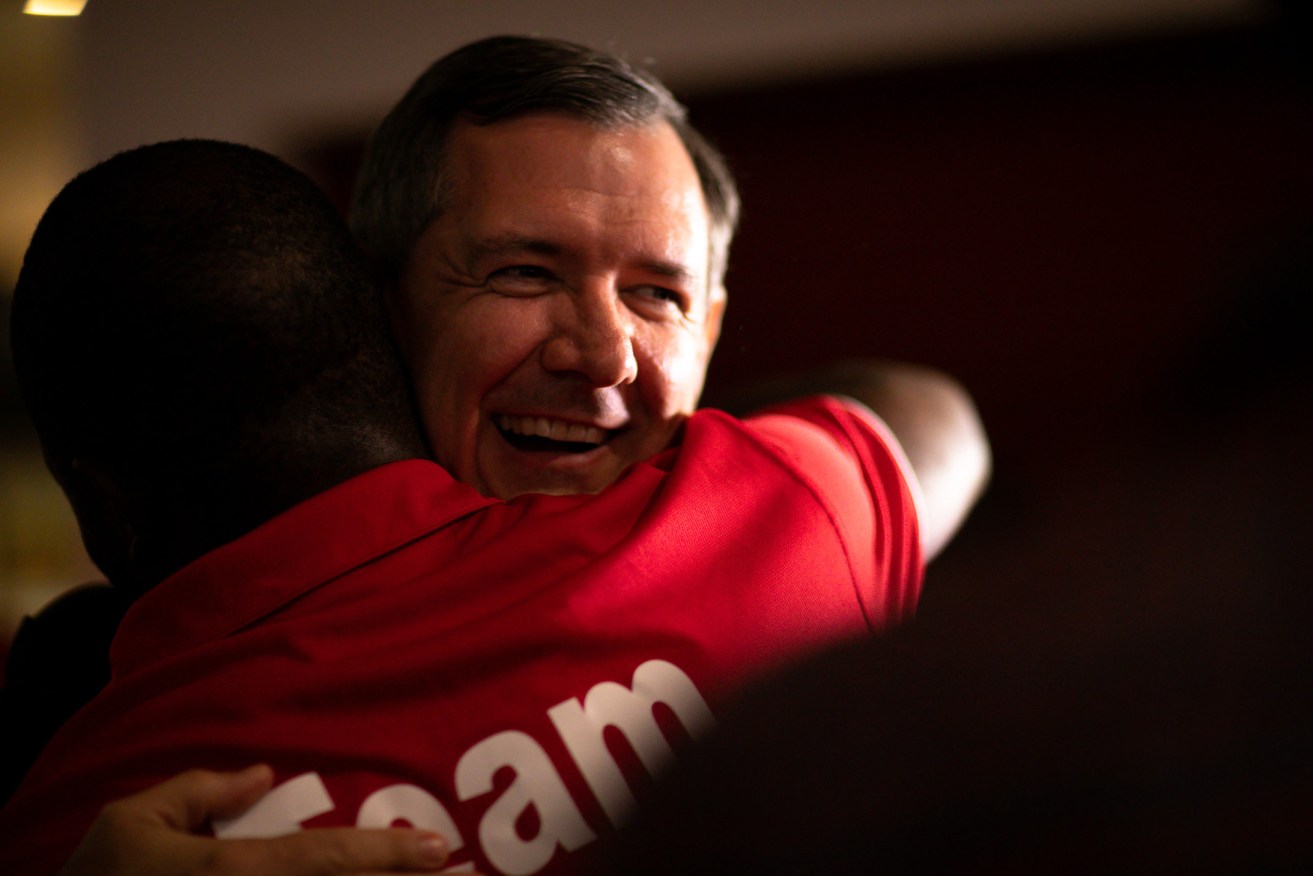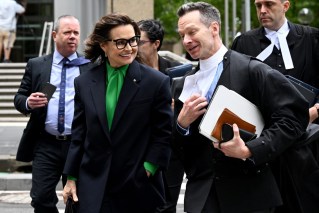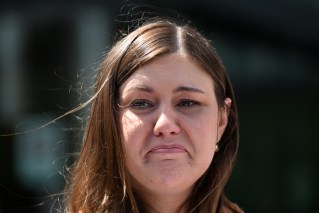Three reasons why Premier should do no more than stick to familiar Territory
Labor’s win in the Northern Territory election has provided the perfect script for Queensland’s premier – but she’s still vulnerable to time and events, writes Dennis Atkins


NT Chief Minister Michael Gunner is seen at Labor's election headquarters in Darwin, where Labor was on track to retain majority government . (AAP Image/Charlie Bliss)
Australia’s first COVID-19 political match-up in the Northern Territory, the first general election in this Year of Pandemic and Recession, tells us three key things, all vital in preparing for the October 31 Queensland poll.
First, providing strong leadership when the health of the community – and lives – are at risk is key to winning support.
Labor’s Chief Minister, Michael Gunner, ran a narrowly focussed, low-risk campaign without the traditional laundry list of promises.
“Saving lives and saving jobs” was his slogan – one supported by a resolution to stay the course with hard border closures. He never missed an opportunity to repeat this basic phrase, day after day.
Beyond this, Gunner’s economic pitch was simplicity personified: a safe community is one that can best protect existing jobs. The Chief Minister made a virtue out of debt and deficit, saying he’d make no apologies for “throwing the kitchen sink” at the crisis.
Next, incumbency matters more than at any time in most people’s memory. Voters have had their lives turned upside down – they have watched parts of the economy shut down, witnessed the biggest Federal Government economic support package in history and felt the threat of a disease that’s insidious and infectious.
In such circumstances, the idea of further change is anathema. Keeping the incumbent government in place – especially one that has performed well in the minds of voters – is akin to hanging on to a security blanket.
Finally, community safety in a pandemic might be almost everything but other issues should not be ignored. This was most apparent in Alice Springs where the state of the economy – in a town that relies on tourism as its lifeblood – is always a mood shifter.
The other big concern in Alice Springs was youth crime. It has been a running sore in the Territory and locals are at their wits’ end. A comparison with the crime situation in and around Townsville in Queensland’s far north is valid and the Labor Government still struggles to get on top of it.
The political trajectories of Gunner and Annastacia Palaszczuk this year have had scarily striking similarities.
In January it was impossible to get anything but the longest odds for the reelection of either leader. They were at the helm of governments with weak economic records, poor official finances and problems with local issues such as development and public order.
However, the pandemic gave Gunner and Palaszczuk a new way to communicate – a fresh story and an opportunity to demonstrate strength and resolve. Each of them rose to the occasion.
After this initial success in handling the virus and its health and economic consequences, Gunner and Palaszczuk found themselves under pressure to relax their hard border shutdowns in June.
Both leaders offered plans for the staged reopening of borders but the Victorian second wave and its leakage into New South Wales caused a quick and decisive rethink.
In the Territory, this shift in the public’s attention and the change in sentiment it prompted provided the bedrock for Gunner’s victory at the election.
With two months to go until Queensland goes to the polls, the Labor Government here is still hostage to time and events.
Will there be a dramatic change in the prevalence of the virus in Victoria or elsewhere? Will there be any other big game-changing happening in terms of a vaccine or some other presently unforeseen circumstance?
These questions are worth remembering but the probability of something on the upside is unfortunately low.
Rather, Palaszczuk will go into the election with her current strong standing as preferred premier and also with high marks on handling the crisis.
One political attack Gunner used in the Territory poll will be doubtless noted and copied by Queensland Labor.
The Territory opposition leader Lia Finocchiaro chanced fate in mid-June by saying if she was chief minister she would open the borders “next week” – a call echoed in Queensland where the LNP’s Deb Frecklington said at the same time the borders here should be unlocked on July 1.
In the Territory, Labor made Finocchiaro own her words by using them in social and paid media, on billboards and at every opportunity throughout the campaign.
Expect Queensland Labor to do the same.
There are also some lessons on unity. The conservative side of Territory politics has spent this past term split with a breakaway new group, the Territory Alliance, formed by a one time Country Liberal Party leader and chief minister Terry Mills.
This splintered the vote, causing Mills and his two fellow minor party incumbents to most probably lose their seats.
This shows how fraught divisions can be and could provide clues for Queensland where the LNP will have One Nation, Katter’s Australian Party and Clive Palmer on their side of the field. It’s another ingredient in the instability and uncertainty recipe.
They say history never repeats but it sometimes rhymes. The Queensland election on October 31 may well rhyme with what we saw in the Northern Territory at the weekend.












